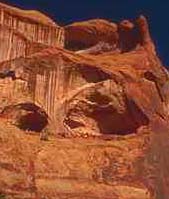20 July 1998
Scientist Draws Timeline In The Sand To Challenge Scientific Creationists
 When the Scopes "monkey trial" of 1925 brought the contest between Darwinism and religion to the fore of the world's attention, a debate between creationism and evolution was unleashed that continues to rage. Seventy three years later, the "creation science" that insists on a literal interpretation of the Bible is again gaining popularity in school board meeting rooms and legislative halls across America
When the Scopes "monkey trial" of 1925 brought the contest between Darwinism and religion to the fore of the world's attention, a debate between creationism and evolution was unleashed that continues to rage. Seventy three years later, the "creation science" that insists on a literal interpretation of the Bible is again gaining popularity in school board meeting rooms and legislative halls across America
But one man has decided to fight back. Using fire to fight brimstone, Donald Wise, Franklin & Marshall geosciences professor, has formulated a composite time frame of geologic events based on creationist literature. And in an article published recently in American Scientist, Wise holds no punches.
The piece highlights what Wise sees as gaping inconsistencies in creation science models of the earth, and shows how scientific evidence increasingly supports modern palaeontology.
"The time has come to stop fighting defensive skirmishes," he says, "and to start challenging creationists to defend in toto what they call science - humorous absurdities and all."
For example, Wise notes that since the beginning of fossil-hunting, the earth's rock layers have yielded a record of life with a consistent pattern. More and more life forms appear at progressively higher and newer levels. Creationists, on the other hand, argue that during the great Biblical flood, the high-order animals ran to the mountain tops to escape the rising waters and were the last to be washed away and buried.
Yet this interpretation fails to explain "why burial sequences for fish, marine reptiles and marine mammals followed the same pattern of increasing complexity, when these groups should have been relatively unaffected by rising waters."
Wise adds: "The creationist strategy has been to portray this debate as a choice between their cartoon of science or their particular brand of religion. As scientists, we must emphasize repeatedly that the argument against creationism is not against religion as such, but rather against a fringe group's attempt to force the Bible into public schools in the guise of a textbook."
